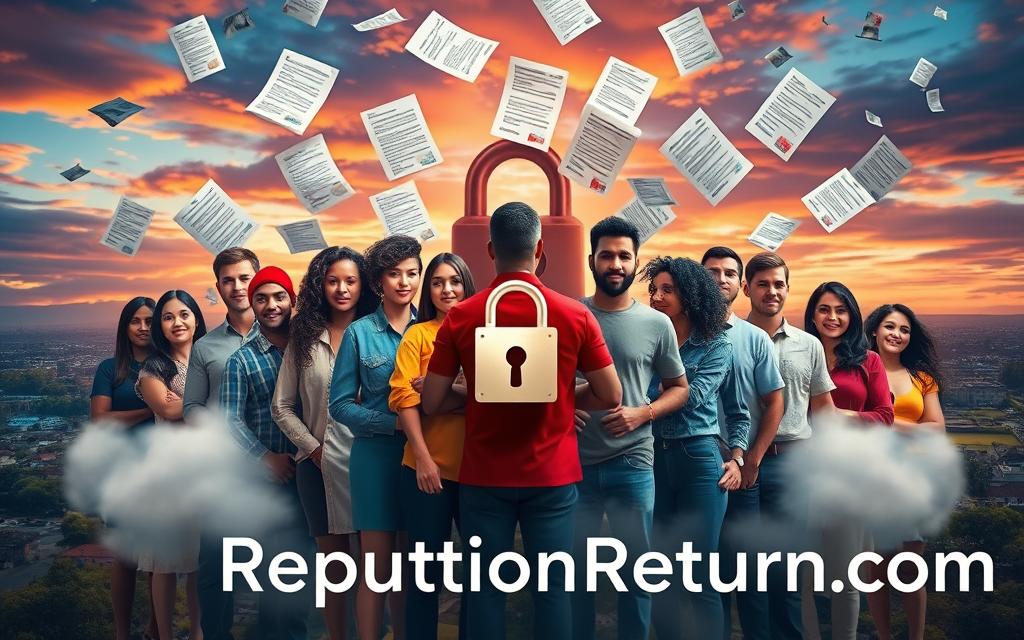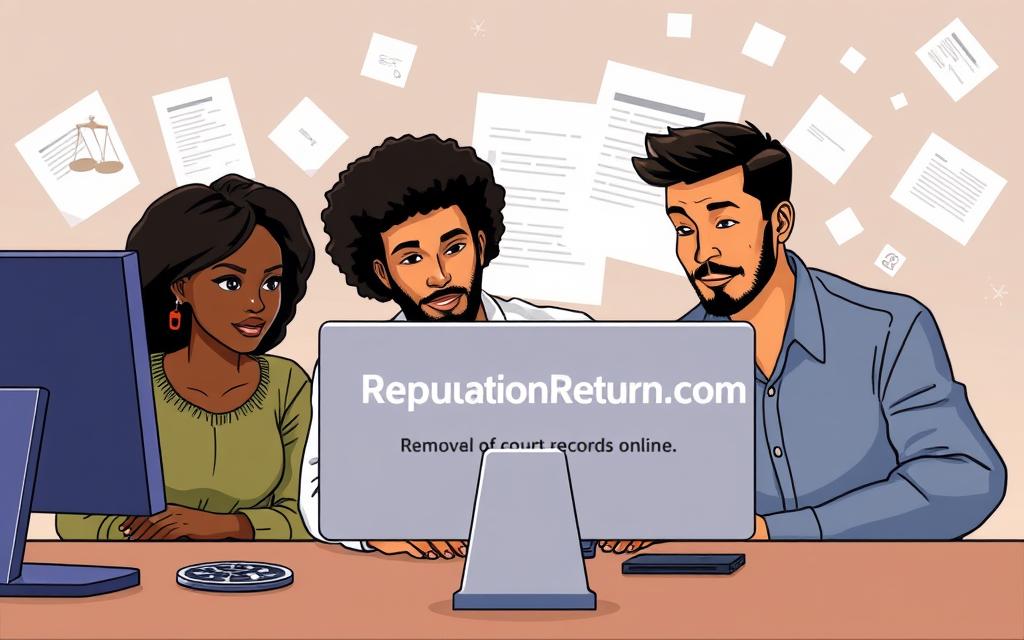Removing court documents from the internet is complex but vital for privacy and reputation. This guide covers strategies and legal options to manage your online presence. It includes understanding public court records, expungement or sealing, and online reputation management.
Most websites with court records are trusted by Google, making them easy to find. The number of clicks a link gets affects its search ranking in 2021. Sites like Justia, Juralindex, Casetext, and others have a lot of legal info and court records. It’s important to act quickly to manage this.
Understanding Court Records and Why They Appear Online
Court records are documents from legal cases. They include things like evidence and witness statements. The county Clerk of Courts keeps them and they’re public. But, having court records online can affect someone’s reputation and privacy.
What is a Court Record?
A court record is any official document from a legal case. These records have personal details and court decisions. They’re meant to be public, but being online can cause problems for people.
Why Court Records Rank Highly on Google
Court records are easy to find online because of things like domain authority and website traffic. This means even small cases can be found easily. The importance of court records online can hurt someone’s personal and work life.
| Statistic | Value |
|---|---|
| Percentage of people who go beyond the first page of Google search results | Approximately 10% |
| Percentage of individuals who visit the second page of Google when conducting searches | Less than 10% |
| Percentage of individuals who tend to click on results appearing on the second page of Google search results | Less than 10% |
Knowing how important court records are online is key to managing them. It helps in removing them from the internet.
Regulations Allowing Public Access to Court Records
In the United States, the First Amendment and the Freedom of Information Act (FOIA) ensure public access to court records. Each state also has its own laws about public records. These rules help make the justice system transparent but can make it hard to remove court records from the internet.
First Amendment and Freedom of Information Act
The First Amendment guarantees the public’s right to see court proceedings and records. The Freedom of Information Act (FOIA) of 1967 makes sure the public can access government files, including court records. But, some information like social security numbers and adoption cases is kept private.
State Public Records Laws
Every state has its own rules for public records. These rules try to balance the public’s right to know with privacy needs. Courts usually don’t seal records easily, needing strong reasons to do so.
These rules aim to make the justice system open and accountable. But, they can make it hard for people to remove their court records from the internet. Even if you can’t remove your case, there are ways to make it harder to find online.
| Key Regulations | Details |
|---|---|
| Electronic Access to Court Records |
|
| Protecting Personal Information |
|
| PACER and E-Filing |
|
Knowing the laws about public access to court records is key to removing your info from the web. These laws help keep the justice system open but can make it tough to protect your privacy. By looking into your options, you can try to reduce how visible your court records are online.
Remove Court Documents from the Internet: Exploring the Options
Removing court documents from the internet gives people two main choices: complete removal or hiding them from search engines. Complete removal means getting court records sealed or expunged. This can be hard and takes a lot of time, depending on the record type and situation. If you can’t remove them completely, you can use online tactics to hide them from search engines. This makes them harder to find online.
Complete Removal through Expungement or Sealing
Expungement clears records from both public and private databases. But, it’s not available everywhere. Sealing records hides them from the public, but government agencies can still see them. Both methods have rules and limits that change from state to state. This makes the process hard and slow.
Search Engine Suppression and Online Reputation Management
If you can’t remove court records fully, you can try to hide them online. This means making more positive content to push the bad news down. But, search engines like Google don’t usually hide content unless it’s really bad. They prefer to remove content at its source.
Removing online criminal records is tough because of legal rules, who can see them, and where they’re stored. Some say we need new laws to help remove these records online. The current laws don’t give many options because of free speech protections.
| Option | Description | Pros | Cons |
|---|---|---|---|
| Expungement | Permanently clears records from private and public databases |
|
|
| Record Sealing | Hides records from public view, but they can still be accessed by specific government agencies |
|
|
| Search Engine Suppression | Pushing down court records in search engine results through online reputation management |
|
|
Choosing how to remove court documents from the internet or remove court records from the internet is tricky. It involves thinking about the law, cost, and how much time it takes. Sometimes, getting rid of records completely through expungement or sealing is the best option. But, it’s hard and might not always work. So, people often look at hiding them from search engines as an alternative.

Complete Removal Through Expungement or Sealing
Removing court documents from the internet often means getting them sealed or expunged. The process depends on the type of record. Civil records are usually easier to seal than criminal ones. The crime’s severity, the record’s age, and the person’s history affect the outcome.
Civil Court Records
Sealing civil court records is simpler than sealing criminal ones. You might need to file a motion with the court for this. Each state has its own rules for sealing these records, so knowing the local laws is key.
Criminal Court Records
Expunging or sealing criminal records is harder. You must meet certain conditions like the crime type and time since conviction. You might need to file a petition, provide documents, and go to a hearing.
It’s vital to understand the process for expungement or sealing records. Legal experts can guide you through the steps and increase your chances of success.
Removing court documents from the internet is complex. Exploring options like expungement and sealing is key to protecting your online reputation and privacy.
Online Reputation Management and Search Engine Suppression
When removing court documents from the internet isn’t possible, online reputation management (ORM) can help. This method uses positive web content to push court records down in search results. By using SEO, court records can be made less visible, improving your online image.
Creating Positive Content to Outrank Negative Results
ORM focuses on making positive content to beat the negative court records. This includes:
- Creating a professional website with interesting content
- Being active on social media like LinkedIn, Twitter, and Facebook
- Writing guest posts for industry websites
- Sharing videos on YouTube, like interviews or expert pieces
- Using relevant keywords and SEO to make content search-friendly
By making and sharing great content, you can move negative court records down in search results. This helps improve your online reputation management and search engine suppression.
| Service | Description | Key Benefits |
|---|---|---|
| NetReputation | Offers content suppression and online reputation management services to keep personal information out of top search results. | Free consultation, specialized in both suppression and content removal, contact at 844-461-3632. |
| FixYourName | Assists in suppressing negative results in search engine pages or taking legal action to remove content, depending on the situation. | Comprehensive approach to negative online content removal, with positive outcomes typically seen within 30 business days. |
Seeking Professional Help for Court Record Removal
Removing court documents from the internet can be hard and takes a lot of time. If you don’t have the time, skills, or resources, getting help from a professional court record removal service is a good idea.
These experts will look at your situation, make a plan, and take the steps to remove or hide your court records online. They know a lot about the law and have connections with online sites. This makes the process easier and ensures you follow the law.
Privacy lawyers who focus on removing records can help you understand how to seal or erase your criminal past. This is great for people wanting a clean slate and to leave past legal troubles behind.

